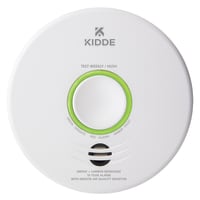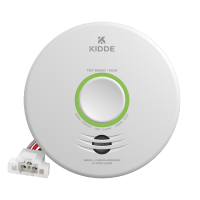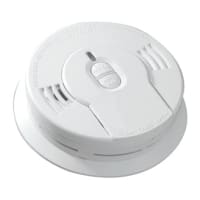It's a sound many homeowners have heard: the 3 a.m. alarm chirp. Why does it happen? Well, it's a simple matter of the battery's charge level and a home's air temperature.
As a smoke alarm's battery nears the end of its life, the amount of power it produces causes an internal resistance. A drop in room temperature increases this resistance, which may impact the battery's ability to deliver the power necessary to operate the unit in an alarm situation.
This battery characteristic can cause a smoke alarm to enter the low battery chirp mode when air temperatures drop. Most homes are the coolest between 2 a.m. and 6 a.m. That's why the alarm may sound a low-battery chirp in the middle of the night, and then stop when the home warms up a few degrees.
Can you reduce the possibility of this happening?
Yes! Here are some steps you can take:
-
Replace the batteries in all your alarms, and remember to test them weekly.
-
Check the age of your smoke alarms. Kidde recommends replacing all smoke alarms - battery and hardwired - every 10 years. If your alarms are older or you don't know their age, you should replace them.
-
CO alarms will sound a required "end-of-life" chirp after seven to ten years of power. Beat the beep by replacing outdated alarms.
If your alarm is going off and you don't know why, check out our article on "What is Causing My Smoke Alarm to Sound, Beep, or Chirp?" for tips on solving the problem.
If it's between the hours of 8 a.m. and 5 p.m. EST Monday through Friday, a member of our product support team is available at 1-800-880-6788 to answer your questions.





